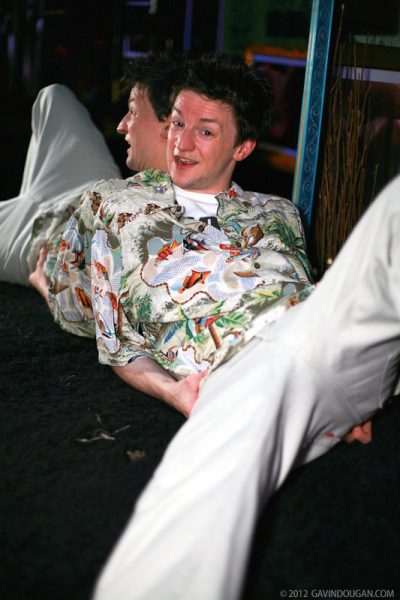In times of austerity, the arts are always hit particularly hard. Having comparatively little economic ‘value’ or yield, many of those entrusted with the power to make cuts are all too happy to inflict deep – and potentially fatal – slashes to funding. The last few weeks alone have seen Creative Scotland remove funding from 49 organisations (that’s on top of Arts Council England’s 206 last year), while people as disparate as David Grieg and Andrew Lloyd-Webber have vociferated on the damage being done to the industry. There are, of course, the myriads of self-funded theatre companies which spangle the arts scene, many of which descend upon the Edinburgh Fringe Festival every year to showcase the fruits of their creative (and economic) labours. But how does this mode of financing affect the theatre produced?
‘I suppose it’s quite liberating’ says Andrew Simpson of the Edinburgh-based theatre ensemble, Cathartic Connections, whose new play Gob Shop is being performed at this year’s Festival. ‘The problem is if you’re going to get, for example, Creative Scotland funding, you’re effectively going to get funding from the government. From that point of view you’re kind of obliged to follow their aims and objectives – and that’s why they’re going to fund you. It‘s good not to have to jump through hoops for anyone else. It gives you a sense of total ownership over what you‘re doing; we‘re not hindered or limited by any outside force‘.
With less money available and conditions of finance becoming more stringent, Simpson is not the only concerned with the looming spectre of outside ‘forces’ shaping the artists’ products. In June, Forced Entertainments’s artistic director, Tim Etchells, expressed a similar sentiment when pointing out how funding bodies are now asking how the applicants intend to help deliver the sponsor’s vision, rather than vice versa. But even this creative freedom comes at a price.
‘Obviously it’s a challenge doing these things off your own back,’ Simpson continues. ‘I think with a lot of the funding climate at the minute you need a proper corporate plan, and that’s a different step from where we are now. We considered those things [funding bodies] but the feeling I’m getting is that doing that is doing ‘Theatre’ theatre: it’s expensive! It seems almost like we’re moving away from that kind of thing. It’s not about elaborate sets, illusion or fourth wall, it’s about the performance.’ Yet even without excess in all other expenses, there is still the question of what is often the single biggest chunk of any budget: the venue.

‘One of the good things about Sapphires, apart from it being the perfect space, is that we’re getting it cheaper than you’d get a conference room in a hotel you’d pay through the nose for. When someone said we could do it there, we were like “that’s amazing – let’s do that!” From there, the directors gave us tasks to break down preconceptions (and it wasn’t how I’d expected it; I’d imagined a Motley Crue video, but a lot of it is very businesslike). Also coming up with characters from the physicality or from some text. And the text might quote from Ian Paisley or something. It’s that whole Christian morality, judging people thing. It was all quite organic.’
It’s a testament to art’s unique ability to make something out of nothing that even without funding and with the thinnest of budgets that theatre groups, like Cathartic Connections, are able to produce and stage drama. And with the ongoing cuts, it looks like this may soon become the modus operandi for the vast majority of the companies at work. However, if it continues to produce theatre that is rough, raw and unshackled, there may just be a silver lining.
Cathartic Connections’ Edinburgh Fringe show, Gob Shop, is showing at the Sapphire Rooms (Venue 77), until 26 Aug, 16.30.
